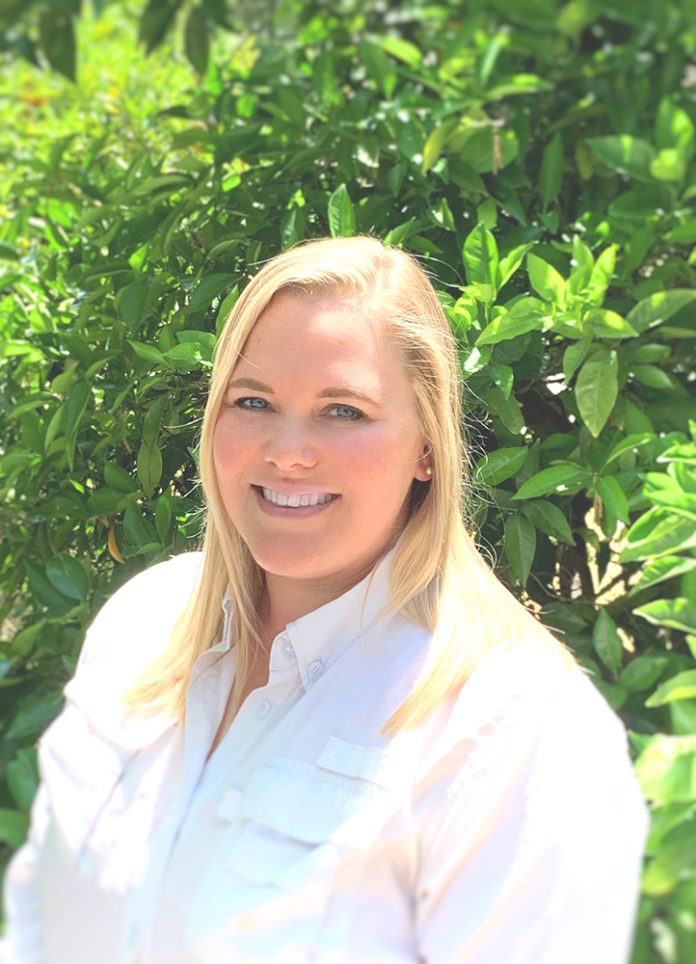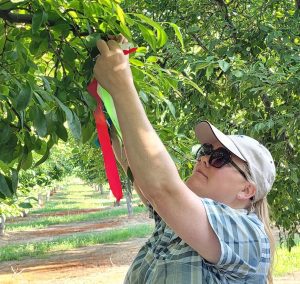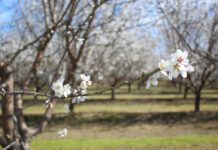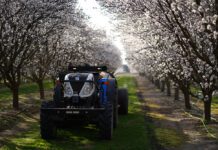
Becky Wheeler-Dykes chose the wrong major. She started out pursuing civil engineering at UC Davis but knew quickly it wasn’t for her. After convincing her parents she’d be happier in a new area of study, she found herself majoring in crop science and business management and minoring in ag pest management. It was the beginning of a journey that would eventually lead her to UCCE, where she began serving as the orchard systems and weed ecology farm advisor for Glenn, Tehama and Colusa counties this past May.
Growing up on a small walnut and prune farm in Gridley, Calif., the new farm advisor had some specific ag related interests. As kids do, she often explored those curiosities as a child. In her case, she imagined she was a plant breeder, pretending to cross fruit trees in her family’s orchard.

“I was always out catching insects and frogs and playing in the orchard, so I probably should have known that this is where my path would bring me,” Wheeler-Dykes said.
Having never been involved in programs like 4-H or FFA, she said that was where her ag experience more or less ended before college. But she would find her way back to ag once she recognized her academic blunder.
“I realized I don’t really like buildings, I don’t really like being inside and doing that stuff, so I pretty quickly changed my major,” she said.
In those early days, Wheeler-Dykes started doing research with the Walker Lab at the UC Davis Department of Viticulture and Enology. The venture gave her a taste of the passion she was craving to find in the industry.
“I just really loved that feeling of the moment where you discover something that’s really potentially impactful, and you know that you’re really helping growers,” she said. “You’re not just doing research for the sake of research; you’re doing research that’s actually going to have an effect and really positively impact people.”
Wheeler-Dykes said she especially understands how meaningful that kind of work, the same work she’s doing now with UCCE, can be.
“I really, highly value this work, so it made sense for me to end up here,” she said.
Discovering what career paths she was interested in during her college career was like putting puzzle pieces together, she explained. Once she recognized that she liked to be outdoors, conducting applied research and talking to growers one on one, she knew she was heading in the right direction.
“I like seeing the effects of my work and seeing how it’s actually helping the industry,” she said. “I didn’t really understand that there was this role, this career that brought all of those things together.”
After receiving her bachelor’s degree, she remained at UC Davis where she earned a master’s degree in entomology. Once she had children, Wheeler-Dykes moved up north to be closer to family. There, she landed at Sierra Gold Nurseries as a lab manager, working on their tissue culture program, before then heading to California State University, Chico, where she lectured in soil science and ag ecology and contributed to research on mechanical hedging on prunes and olives in Tehama and Glenn counties.
Her position at Chico State was one that helped her transition seamlessly into her current one, she says.
“I was working with all the farm advisors and several of the growers up here,” she said, “so I already knew the team really well, and it just felt like a really nice, easy transition to this position. It’s been really helpful.”
Wheeler-Dykes credits many UC farm advisors, too numerous to name, with inspiring her along the way.
“I saw this world where there were highly respected scientists who were doing research on the ground, who were interfacing with growers, who were a really integral and important part of agriculture. That was really incredible to me,” she said.
Ready to Serve the Growers
Wheeler-Dykes, who will be based out of the Glenn County office, said the UCCE team, growers and producers in the area have been incredibly welcoming to her so far.
“It feels like a really good fit,” she said.
While there were a number of open farm advisor positions in the north state as she was looking to join UCCE, Wheeler-Dykes said it was the orchard systems and weed ecology advisor that seemed like the right fit, since orchards have always been her passion.
“I think that’s kind of always the direction I was going into,” she said. “The weed ecology part just kind of ended up fitting with the needs of the region. It’s not necessarily my specific background, but I’m excited to step into that role and expand my expertise.”
Currently, almonds and walnuts make up most tree nut crops in Glenn, Tehama and Colusa counties, with some pecans and a steadily increasing acreage of pistachios, she said.
As she continues getting to know the growers in her area, Wheeler-Dykes recognizes many of the challenges looming on the horizon that she believes will be of concern, including California regulations and increasingly intricate world markets.
“I think those two are really going to be tricky with the number of acres planted, both in California and worldwide, for various crops. It’s always going to be a challenge to keep that in balance,” she said.
Other areas she expects to address as farm advisor in the future include climate concerns and drastic weather years, while concerns she’s heard from growers so far have involved irrigation issues and questions about what to prioritize in lean price years.
To tackle these issues and more Wheeler-Dykes says her approach is to work with her fellow researchers while continuing to see what questions come up from growers so she can take her cues from them.
“I think most of the really important research the farm advisors and other ag researchers do, we get the inspiration from the needs of the growers,” she said.
Wheeler-Dykes is Filling a Void
The need for someone to step into the role of orchard systems and weed ecology farm advisor in the three counties has been greatly needed the last few years, according to Franz Niederholzer, an orchard systems farm advisor in Colusa, Sutter and Yuba counties.
The position has been vacant since the fall of 2019, and Niederholzer said the need for a weed specialist is especially great as growers tackle how to deal with a greater number of Roundup-resistant weeds. Weeds like fleabane and bluegrass are of the greatest concern due to their resistance, Niederholzer explained, adding he’s sure there will be an even greater number of resistant varieties to come for Wheeler-Dykes to address with growers.
“There’s a need for weed management knowledge, and certainly in orchard crops, there’s a real need,” he said.
Niederholzer is already quite familiar with Wheeler-Dykes, having been one of the UC advisors she worked with during her time at Chico State, he said.
“She’s a great addition to the farm advisor group,” he said. “UC extension is really fortunate to have some great, young advisors come on in the last five or six years.”

Kristin Platts | Digital Content Editor and Social Correspondence
Kristin Platts is a multimedia journalist and digital content writer with a B.A. in Creative Media from California State University, Stanislaus. She produces stories on California agriculture through video, podcasts, and digital articles, and provides in-depth reporting on tree nuts, pest management, and crop production for West Coast Nut magazine. Based in Modesto, California, Kristin is passionate about sharing field-driven insights and connecting growers with trusted information.















